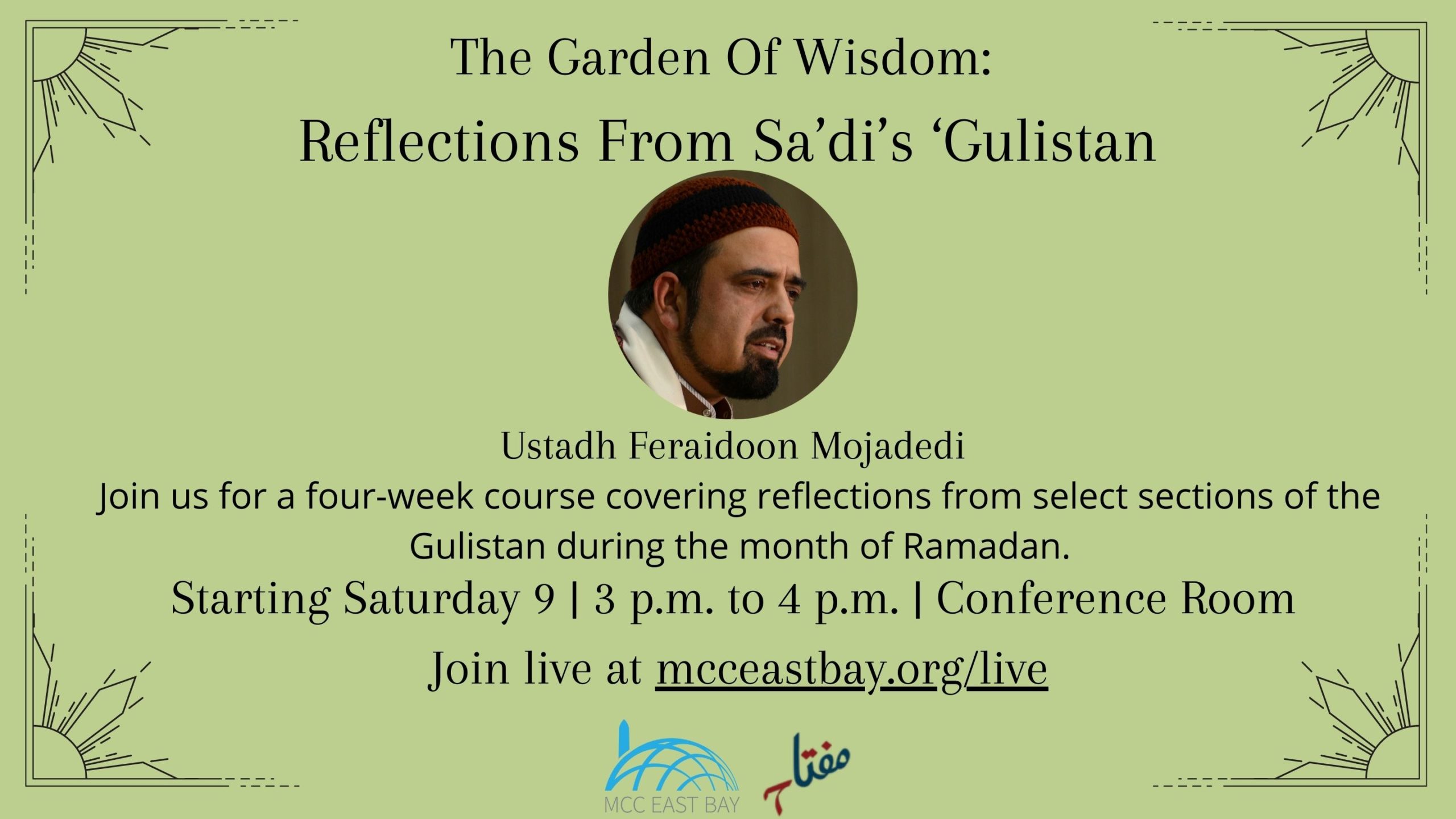Join Ustadh Feraidoon Mojadedi as he shares reflections from select sections of the acclaimed Gulistan during the month of Ramadan, the month in which we hope our hearts and minds are able to embody the best of traits.
Saturdays in Ramadan (April 9, 16, 23, & 30) | 3 p.m. to 4 p.m. | Join in person in Conference Room or watch virtually at mcceastbay.org/live
- – More Sidi Feraidoon: https://mcceastbay.org/feraidoon
- – More Ramadan workshops: https://mcceastbay.org/ramadan-workshops
This event will also be live-streamed to Miftaah Institute‘s Ramadan Immersion program.
Few works in traditional poetry and prose have gained prominence in the way Sa’di’s Gulistan has. Having spent a significant part of his life in the suhbah of scholars, rulers, and the righteous, Sa’di decided to gather the most impactful stories and poems that would help the believer in internalizing the most important principles needed to navigate this Dunya.
OBJECTIVES
What will you learn?
- – A brief overview of the life and times of Sa’di and his legacy
- – Readings of select sections of the Gulistan
- – Reflections on the readings with a focus on the principle being presented
- – Discussions on practical methods to instill the principles in our lives during Ramadan and onwards
Questions? events@mcceastbay.org
About the Speaker:
Ustadh Feraidoon Mojadedi is one of the most well-known and respected community leaders, lecturers, and entrepreneurs in the Bay Area – California. He was born in Herat, Afghanistan and immigrated with his family to America during the Russian invasion of Afghanistan in 1985. After graduating from American High School and Chabot College he attended San Francisco State University where he majored in history.
He grew up in a household with a deep love and reverence for poetry. At the age of five, he began to memorize poems by Rumi and other great poets. His love of poetry continued to grow and eventually developed into a passion and calling that would allow him to teach regular classes on Rumi throughout California, the U.S., U.K., Canada, Australia, Malaysia, Germany and even as far as Konya, Turkey, where Mawlana Rumi is laid to rest. The nuances of the Farsi language, in which he is fluent, allow him the unique ability to bring Rumi’s poetry to life and to help listeners recognize Rumi’s essential message of peace, love, coexistence, and connection with the Divine. He is the author and performer of “Layla & Majnun,” a play produced by Performing Lines in Perth Australia.
Ustadh Feraidoon spends his free time reading, studying, and lecturing on many topics including Rumi and a wide collection of Farsi poetry, spirituality, and self-development. He currently lives with his wife and two children in Dublin, California.
About the book:
Gulistān (Persian: گُلِستان, romanized: Golestān, lit. ‘The Flower Garden’; [golestɒːn]), sometimes spelled Golestan, is a landmark of Persian literature, perhaps its single most influential work of prose. Written in 1258 CE, it is one of two major works of the Persian poet Sa’di, considered one of the greatest medieval Persian poets. It is also one of his most popular books, and has proved deeply influential in the West as well as the East. The Golestan is a collection of poems and stories, just as a flower-garden is a collection of flowers. It is widely quoted as a source of wisdom. The well-known aphorism still frequently repeated in the western world, about being sad because one has no shoes until one meets the man who has no feet “whereupon I thanked Providence for its bounty to myself” is from the Golestan.
The minimalist plots of the Golestan’s stories are expressed with precise language and psychological insight, creating a “poetry of ideas” with the concision of mathematical formulas. The book explores virtually every major issue faced by humankind, with both an optimistic and a subtly satirical tone. There is much advice for rulers, in this way coming within the mirror for princes genre. But as Eastwick comments in his introduction to the work, there is a common saying in Persian, “Each word of Sa’di has seventy-two meanings”, and the stories, alongside their entertainment value and practical and moral dimension, frequently focus on the conduct of dervishes and are said to contain Sufi teachings. Idries Shah elaborates further. “The place won by the Golestan as a book of moral uplift invariably given to the literate young has had the effect of establishing a basic Sufic potential in the minds of its readers.”



